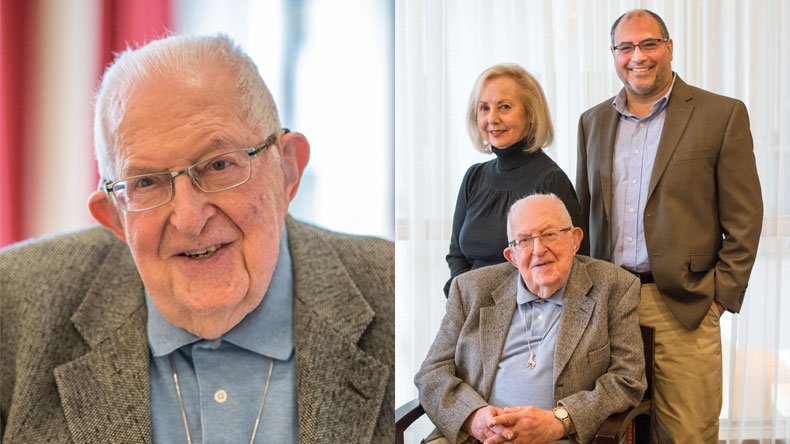Changing Assumptions About Aging in Our Society

Left: Irving Silverman and Right: Irving Silverman (seated) with Dr. Erlene Rosowsky and Dr. Aladdin Ossorio
Women and men in nursing homes, assisted living facilities, and retirement communities too often face a patronizing and infantilizing attitude from their caregivers. The sense of shame and isolation this treatment breeds can take a toll on our senior citizens’ physical and mental wellbeing, and leave them feeling misunderstood and lonely.
"William James College understands that older individuals are an underserved segment of our society. Promoting mental health requires that we stop thinking only in terms of pathology. We’re not sick." —Irving Silverman, 95-year-old optimist, advocate, and philanthropist.
Thanks to innovative work at William James College, however, the way we see the elderly in our society is about to evolve. And the timing couldn’t be better.
Right now, the United States is experiencing the greatest demographic sweep in its history. Baby Boomers—most of whom are in their 60s now—are living longer, healthier lives than any other generation before them. In fact, by 2030, there will be more people over the age of 80 than under the age of five.
It’s time to set new expectations, introduce new services, and bring new attitudes and approaches, if we want this burgeoning population to thrive physically, emotionally, socially, and psychologically.
According to Erlene Rosowsky, PsyD ’88, Director of the William James College Geropsychology Concentration and the College’s Center for Mental Health and Aging, and an alumna of the College, “We need to reshape our definition of aging to be less toxic—and to develop a more enlightened approach to how we care for our senior population.” Geropsychology is a branch of psychology that addresses the mental health needs of older adults, including age-related illnesses, depression, and anxiety.
Rosowsky has explored the psychology of aging through her numerous research projects, publications, and teaching responsibilities at both Harvard Medical School and William James College. She has also earned national and international recognition as an expert on late-life personality disorders, acclaim via a Fulbright Specialist grant, and the 2012 American Society on Aging Award “for outstanding contributions to the field of aging”.
Her ultimate goal? To evolve more preventive, protective, and productive approaches to aging: “People have a real fear of aging, and hold on to the myth that aging can be avoided. The truth is, it can’t be avoided. That’s why the upside of aging needs attention. We should focus on how older generations are uniquely equipped to contribute critical knowledge and wisdom to our society."
"We need to reshape our definition of aging to be less toxic—and to develop a more enlightened approach to how we care for our senior population." —Erlene Rosowsky, PsyD, Director of Geropsychology Concentration.
One of Rosowsky's students, Aladdin Ossorio, PsyD, a June '15 graduate of William James College, is excited about the possibilities for meaningful work in his new field. Rather than focusing exclusively on biomedical data about aging, Ossorio is taking a more integrated, person-centered approach-all with the goal of maximizing the cognitive, physical, emotional, and social potential of our seniors.
His inspiration comes, in part, from research conducted at UCLA Medical Center where memory loss was reversed in nine out of 10 people over a two-year period through focused attention on nutrition, lifestyle, social and physical activities.
Ossorio is designing a comprehensive neurocognitive, psychological, and physical assessment and intervention program called SageMind, which will help late middle-aged and older adults optimize their cognitive and physical health as they age. The program will provide individually tailored whole-body health plans based on emerging science showing that multi-domain health optimization can greatly reduce the risk for dementia and other adverse cognitive changes during aging. SageMind, which will be run out of the Brenner Center for Psychological Assessment and Consultation at William James College, will use serial neurocognitive assessments as a tool allowing participants to track and monitor their cognitive health as they age.
Ossorio also hopes to engage a wider audience through a soon-to-be-launched newsletter that will provide emotional, cognitive, and physical health information for older people as well as a series of SageMind-centered lectures and social events.
Irving Silverman, a resident at NewBridge on the Charles—a retirement community in Dedham operated by Hebrew SeniorLife—is playing a key role in advancing geropsychology at the College. At 95, Silverman is an active, energetic individual eager to promote appreciation and respect for longevity. “William James College understands that older individuals are an underserved segment of society. They’ve done admirable work addressing other segments of our society—veterans, the Latino community, and children and families, to name a few—but folks above the age of 65 have unique needs that deserve unique attention, too.”
Silverman points to some of the biggest challenges seniors face: moving from the isolation of a familiar home to a community setting; managing new physical realities; dealing with the loss of friends and loved ones; and maintaining a productive, active mind—especially when those tasked with your care assume your mental decline is inevitable. “Promoting mental health requires that we stop thinking only in terms of pathology. We’re not sick.” he insists.
Silverman made a generous gift to enable William James College to recruit and train talented new geropsychologists, as well as to develop new programs, conferences, lectures, and publications that will specifically address the mental health needs of seniors.
"There are 120 people at NewBridge over age 90,' Silverman says. "They are accomplished people, and they still want to continue to contribute and give back to society. I’d like others to realize they have much to give—and that they shouldn’t give up on us."
- Tags:
- Around Campus
Topics/Tags
Follow William James College
Media Contact
- Katie O'Hare
- Senior Director of Marketing
- katie_ohare@williamjames.edu
- 617-564-9389
